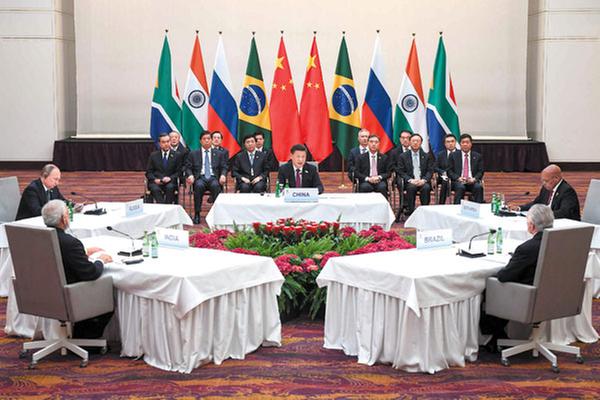Experts laud Xi's idea for G20 growth

 |
| President Xi Jinping presides over a meeting of the BRICS countries - Brazil, Russia, India, China and South Africa - on the sidelines of the G20 summit in Hamburg on Friday. Xi encourgaed the group to play a leading role in improving global governance and backing African nations and other developing countries.[Photo/Xinhua] |
President's speech details the need for a more inclusive system to benefit all
President Xi Jinping has consistently shown China's strong commitment to act as a responsible global stakeholder by advocating an open economy and promoting multilateral trade, inclusive growth, and the digital economy, experts said.
They commented after Xi made several suggestions regarding economic growth and international trade during the first working session at the G20 summit, in Hamburg on Friday. Delegates also discussed sustainable development, climate change, and coordinating the fight against terrorism at the closed-door meeting.
On Saturday, they will discuss partnerships with Africa, digitization, employment, and female empowerment.
Experts said Xi spoke of continuing efforts to bring regions closer by removing trade and infrastructure barriers, sentiments that echoed proposals he made in January at the World Economic Forum and at the Belt and Road Initiative forum in Beijing in May.
"President Xi has spotlighted the key challenges facing all nations today," said Shada Islam, director of Europe and geopolitics at the Brussels-based Friends of Europe.
"He has illustrated that China recognizes the importance of trade liberalization, open economies, the potential of further using digitization to boost development, and meeting the United Nation's Sustainable Development Goals."
Islam said it is "no secret that the world is looking at Europe and China for leadership" and noted that by mentioning the Belt and Road Initiative, Xi showed China's readiness to work with other countries to tackle major challenges.
Guido Cozzi, a professor of macroeconomics at the University of St. Gallen in Switzerland, said Xi's four suggestions show a very open and mature vision of how the world economy should work.
“This is very reassuring, especially for Europe," said Cozzi. "Both regions benefit from openness and suffer from geopolitical, financial, and environmental risk."
Erik Berglof, director of the Institute of Global Affairs at the London School of Economics, said Xi is continuing to embrace globalization.
"His language is very close to that of the communique from Hangzhou," he noted. But Berglof said many G20 members will also be concerned about the erosion of trade openness and potential dismantling of institutions protecting openness.
Berglof welcomed Xi's idea of collective governance involving leading economies filling the vacuum created by the United States' apparent stepping back from global leadership.
Shi Shiwei, director of the research center for Europe at the Beijing-based University of International Business and Economics, said Xi's emphasis on inclusive growth addresses a major challenge to globalization — the unequal distribution of benefits.
"Xi's advocacy for the benefits of globalization to aid both developed and developing economies is important," said Shi, who said an emphasis on improving industrial capacity, economic liberalization, and climate change mitigation would also help. Shi said financial collaboration, green finance development, labor market development and equality are also important.
Contact the writers at [email protected]

































